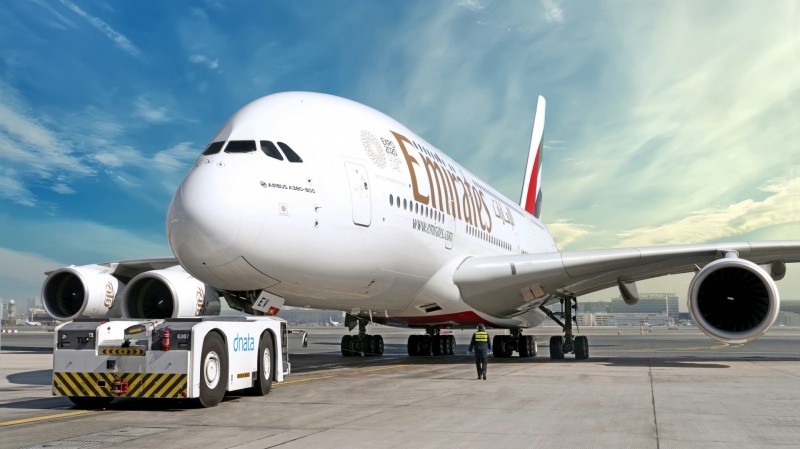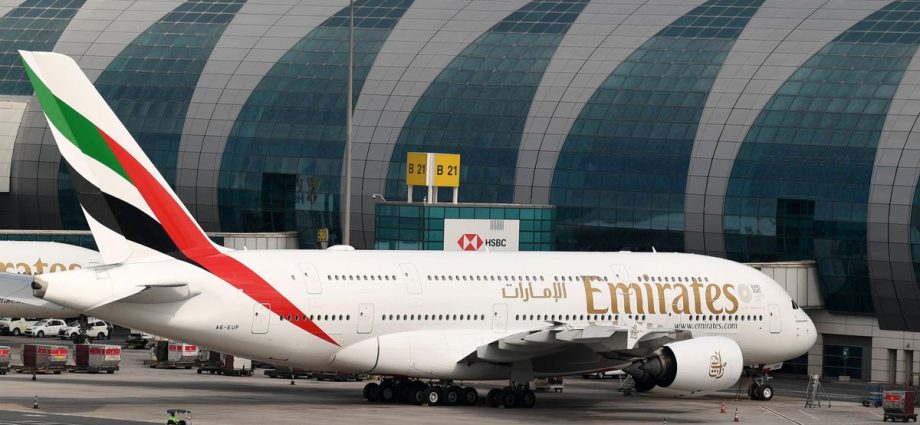Emirates Group announces half-year performance for 2021-22
KARACHI ( Web News )
The Emirates Group today announced its half-year results for its 2021-22 financial year. Group revenue was AED 24.7 billion (US$ 6.7 billion) for the first six months of 2021-22, up 81% from AED 13.7 billion (US$ 3.7 billion) during the same period last year. This strong revenue recovery was underpinned by the easing of travel restrictions worldwide and the corresponding increase in demand for air transport as countries progressed their COVID-19 vaccination programmes.
The Group is reporting a 2021-22 half-year net loss of AED 5.7 billion (US$ 1.6 billion), substantially improved from its AED 14.1 billion (US$ 3.8 billion) loss for the same period last year.

The Group continued to maintain a healthy cash position which stood at AED 18.8 billion (US$ 5.1 billion) on 30 September 2021, compared to AED 19.8 billion (US$ 5.4 billion) as on 31 March 2021.
Sheikh Ahmed bin Saeed Al Maktoum, Chairman and Chief Executive, Emirates Airline and Group said: “As we began our 2021-22 financial year, COVID-19 vaccination programmes were being rolled out at unprecedented scale around the world. Across the Group, we saw operations and demand pick up as countries started to ease travel restrictions. This momentum accelerated over the summer and continues to grow steadily into the winter season and beyond.
The Emirates Group has been able to tap on its own strong cash reserves, and access funding through its Owner and the broader financial community to support its business needs through the unprecedented challenges wrought on the aviation and travel industry by COVID-19. In the first half of 2021-22, its Owner further injected AED 2.5 billion (US$ 681 million) into Emirates by way of an equity investment and they continue to support the airline on its recovery path.

Emirates airline
Overall capacity during the first six months of the year increased by 66% to 16.3 billion Available Tonne Kilometres (ATKM) due to a substantially expanded flight programme as more countries eased travel and flight restrictions. Capacity measured in Available Seat Kilometres (ASKM), more than tripled by 250%, whilst passenger traffic carried measured in Revenue Passenger Kilometres (RPKM) was up by 335% with average Passenger Seat Factor recovering to 47.9%, compared with last year’s pandemic figure of 38.6%.
Emirates carried 6.1 million passengers between 1 April and 30 September 2021, up 319% from the same period last year. The volume of cargo uplifted at 1.1 million tonnes has increased by 39%, which brings the business back to 90% of pre-pandemic (2019) levels by volume handled. This shows Emirates Skycargo’s outstanding agility and ability to meet the requirements of its customers whether it be for the transport of vaccines and pharmaceuticals, essential goods like food and perishables, or champion horses and high performance cars.

In the first half of the 2021-22 financial year, Emirates loss was AED 5.8 billion (US$ 1.6 billion), compared to last year’s loss of AED 12.6 billion (US$ 3.4 billion). Emirates revenue, including other operating income, of AED 21.7 billion (US$ 5.9 billion) was up 86% compared with the AED 11.7 billion (US$ 3.2 billion) recorded during the same period last year. The strong revenue recovery reflects quick return of passenger demand wherever flight and travel restrictions were eased around the world.
Emirates operating costs increased by 22% against an overall capacity growth of 66%. Fuel costs more than doubled compared to the same period last year. This was primarily due to an 81% higher fuel uplift in line with substantially increased flight operations during the six-month period up to end of September, and also an increase in average oil prices. Fuel, which was the largest component of the airline’s operating cost in pre-pandemic reporting cycles, accounted for 20% of operating costs compared to only 11% in the first six months of last year.
Driven by the significant increase in operations during the six months, Emirates’ EBITDA recovered to AED 5.0 billion (US$ 1.4 billion) compared to AED 290 million (US$ 79 million) for the same period last year.
dnata
dnata’s businesses in cargo and ground handling, catering and retail, and travel services saw demand return quickly wherever pandemic-related flight and travel restrictions were eased. Demonstrating the agility and capability of its highly skilled teams, dnata was able to respond quickly to customer needs with high quality services – from supporting its airline customers in reinstating flight operations safely and smoothly, to helping customers book their long-awaited travel plans.
dnata’s revenue, including other operating income, was AED 3.7 billion (US$ 1 billion), a 55% increase compared to AED 2.4 billion (US$ 644 million) last year.
Overall profit for dnata is AED 85 million (US$ 23 million), compared to last year’s loss of AED 1.5 billion (US$ 396 million).
dnata’s airport operations remains the largest contributor to revenue with AED 2.5 billion (US$ 688 million), a 52% increase as compared to the same period last year. Across its operations, the number of aircraft handled by dnata increased sharply by 116% to 222,668, and it handled 1.4 million tonnes of cargo, up 9%.

